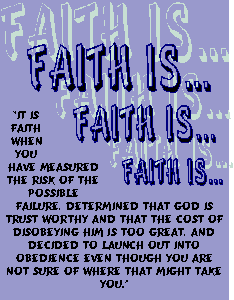|
Faith is more about action, than confession!
Faith is not your ability to put negative thoughts out of your head and think only positive ones. It is not your ability to say only positive things. We feel condemnation when we think or say something that might not perceived as "in faith." As if we deserve some sickness, calamity or failure simply because we let some negative confession out of our lips. Do we deserve sickness and calamity? Because of sin, of course we do, but this is what redemption and atonement are all about. Faith is when you put into action what the scripture or the Holy Spirit has said. The single most important keyword related to faith is action, NOT belief and NOT confession. (Check out Matthew 21:28-31)
Abraham is considered the father of faith because he heard God and obeyed even though the evidence around Him was contradictory. ( Romans 4 & 10:17) There is an ongoing tension regarding faith and works. One which will not be explained in short order. The bottom line is this; God initiated the action with Abraham but Abraham's belief meant nothing without some action.
It is faith when you have measured the risk of the possible failure, determined that the cost of disobedience is to great, and decided to launch out into obedience even though you are not sure of where that might take you. Some might suggest this is fear, not faith. It is the fear of God and the fear of God is inseparably linked to faith. Let's not forget the fear of God is holy and good. We Americans have little idea what the proper fear of God should be. Having the fear of God absolutely requires faith in Him. How could you possibly fear or not fear, or obey or disobey, someone you did not believe existed? We have put far to much emphasis on the "confession of our faith" and much to little emphasis on the "actions" that come as a result of our faith. James clearly tells us that without some sort of action our faith is useless. Confession without action turns real faith into little more than a religious game we play, complete with it's own jargon. This game is played on a secluded and segregated playing field, far from the people for whom God's heart burns. On this playing field, the coach shouts ineffective commands that have little practical application. Our opponents are our brothers and sisters and the score is kept with financial prosperity. We wonder as we play; "Why won't the fans come out?" These religious "faith games" are meaningless, and perhaps even useless, to the lost world for whom Jesus died.
What is mustard seed faith?
Jesus refers to "Mustard seed faith" in both Luke 17 & Matthew 17. The mustard plant was a shrub known for it's ability to grow in rocky dry soils. It was often seen growing between pavers or the large masonry stones of a building. Given time, it would actually move these giant stones. Jesus' audience understood this symbolism. But we want to be awed by manifestations that are instant and undeniable. We want the mountain in the sea NOW... but if the mountain does not move instantly, will our faith remain? Mustard seed faith in these passages displaces the mountain, but this kind of faith requires an ongoing lifestyle of obedience and diligence. This faith is not faith in faith but faith in God, both His character and His sovereignty. We have this Gnostic idea permeating our theology that if I can only focus my thought enough, if I can convince my own mind and not let any doubt words slip out, God must do anything I ask. This is unscriptural, demonic and humanistic hogwash. This is faith in our ability to confess! We laugh at L. Ron Hubbard and call him a false prophet while at the same time we are believing and even teaching his very doctrines! What was Jesus really talking about in Luke 17? Look at the context. Forgiveness is the subject.
"Be on your guard! If your brother sins, rebuke him; and if he repents, forgive him. "And if he sins against you seven times a day, and returns to you seven times, saying, "I repent,' forgive him." The apostles said to the Lord, "Increase our faith!" And the Lord said, "If you had faith like a mustard seed, you would say to this mulberry tree, "Be uprooted and be planted in the sea'; and it would obey you. Luke 17:3-6 (NAU)
Dirt movers!
This teaching is about the faith and obedience required for forgiveness, God doesn't care about wood, dirt and rock. In a nutshell, Jesus says, "Forgive your guts out." The disciples then asked for more faith! Faith was not what they needed, obedience was (obedience = action that results from faith). Jesus then told them if they had a speck of faith they could move giant objects into the sea. They were asking for a type of faith that doesn't require choices or sacrifices. Jesus was asking for a faith that costs everything. I believe Jesus' response here borders on sarcasm!
We've all heard dozens of sermons describing the idea of having a tiny bit of faith and then watching God use it and the ones about having a great amount of faith, coupled with the lack of doubt, so that mountains can be moved. Both of these principles have some scriptural basis. I am not trying to invalidate these. What I am saying is that neither of these points of view emphasize obedience and action.
"If my mind can see it I can have it."
Bologna! Two problems exist with this way of thinking. First, how foolish to limit God to what we could see. Must I see it to have it? "Eye has not seen or ear heard.." Second, over the course of one day, your mind will see many things. You better hope God doesn't give you all of them. Is our confession important? Of course it is, but confession is simply a repeating of what God has already said, not speaking whatever I can dream up. The scripture clearly teaches to be careful with visions, to judge prophecy, and to resist vain imaginations. Why would we be given the responsibility to judge these things if there were not the possibility of error? Where are we to take our stand, on visions? Is this said to exclude visions and prophecy? Absolutely not. My own life has been guided by the prophetic word, but we must remember that even though we may be born again and full of the Holy Ghost, our mind is not completely transformed into the mind of Christ. It will deceive us. Spiritual fantasy is dangerous even if our ideas seem to be beneficial to the kingdom of God. Who is our Master? Who is our sovereign? Who is in control of our lives and our destinies? Is it our mind or the Spirit of God?
This type of faith I am speaking of is willing to go the long haul even without the supporting evidence. This faith makes you faithful. We have changed the meaning of the word "faithful" into "dependable". Dependability is the result of faithfulness. Being faithful simply means, "full of faith." Practically speaking, if you are full of faith you trust the sovereignty and character of God so that you are willing to obey His Word even when you don't understand or see results. This in turn makes you dependable. This faith is not a religious practice but a belief that permeates your soul and spirit, resulting in action, spiritual maturity and Kingdom advancement.
Jim Waldron
|
|



